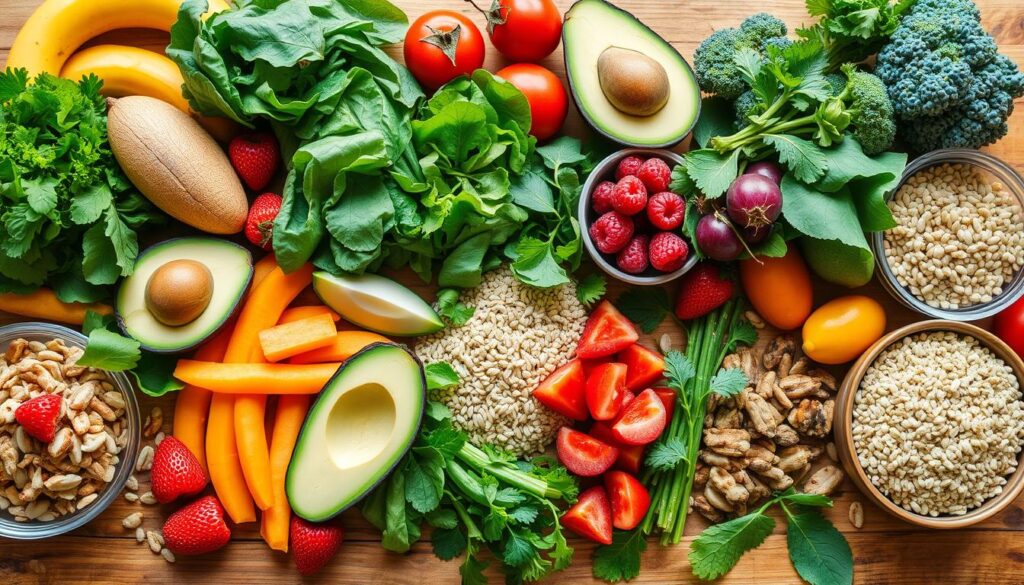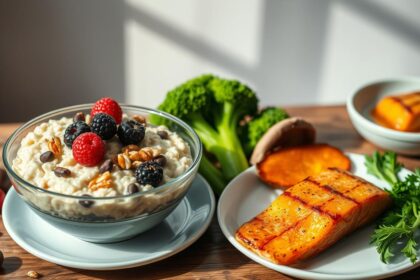Starting a weight loss journey can feel overwhelming. But, ideal nutrition is the secret to success. By eating healthily and watching your calorie intake, you can achieve lasting fat loss. A good diet not only helps you lose weight but also improves your overall health.
Creating a balanced meal plan is key. It mixes healthy foods with easy choices, helping you choose better options. This method saves time and reduces stress, making your weight loss easier.

There’s no single right way to do it. Your nutrition plan should fit your unique needs and life. Adding regular exercise to your diet is a strong way to reach and keep your ideal weight.
Key Takeaways
- Ideal nutrition is essential for effective weight loss
- Balanced meal plans combine health and practicality
- Mindful eating and calorie control are crucial
- Personalized nutrition plans yield better results
- Combining diet with exercise enhances weight loss
- Consistency is key in achieving long-term success
Understanding the Science Behind Weight Management and Caloric Balance
Weight management is all about calorie balance. This means keeping track of the calories you eat and burn. Let’s dive into how energy balance, metabolism, and body composition affect your weight loss journey.
The Role of Energy Balance in Weight Loss
Energy balance is key to weight control. It’s about matching the calories you eat with the calories you burn. For example, women aged 19-30 need 2,000 to 2,400 calories daily, depending on how active they are. Men of the same age typically need more, around 2,400 to 3,000 calories.
Small changes can make a big difference. Eating just 150 extra calories a day can lead to a 10-pound weight gain in a year. On the flip side, burning 150 calories by walking two miles can help maintain a healthy weight.
How Metabolism Affects Weight Management
Metabolism plays a big part in how your body uses energy. It’s not just about how many calories you eat, but how your body processes them. Your age, gender, and activity level all affect your metabolism and energy expenditure.
Understanding Body Composition and Its Impact
Body composition is about more than just weight. It’s the ratio of fat to muscle in your body. Muscle burns more calories than fat, even when you’re resting. This means that building muscle can boost your metabolism and help with fat loss.
Understanding these factors can help you create a more effective weight loss plan. It’s not just about cutting calories, but finding the right balance for your body and lifestyle.
| Age Group | Daily Calorie Needs (Female) | Daily Calorie Needs (Male) |
|---|---|---|
| 2-3 years | 1,000 kcal | 1,000 kcal |
| 4-8 years | 1,200 kcal | 1,400 kcal |
| 19-30 years | 2,000-2,400 kcal | 2,400-3,000 kcal |
Is Ideal Nutrition Good for Weight Loss
Ideal nutrition weight loss programs have seen great success in the last ten years. They focus on eating well and healthy habits, which are vital for managing weight. The Ideal Protein Protocol, for instance, has three phases: losing weight, stabilizing, and maintaining.
One of the best things about ideal nutrition is its emphasis on eating nutrient-rich foods. This ensures the body gets the nutrients it needs, even when eating fewer calories. Let’s explore how the body stores energy:
| Energy Source | Percentage of Reserves |
|---|---|
| Carbohydrates | 1-2% |
| Muscle Mass | 19% |
| Fat | 79% |
Ideal nutrition aims to use up carbs, making the body burn fat for energy. This method is very effective, given that over a third of U.S. adults were obese in 2009-2010, as the CDC reported.
By tackling insulin issues, which are a big cause of weight problems today, ideal nutrition offers a focused weight loss strategy. These programs often give personalized plans, fitting strategies to each person’s needs, no matter their weight loss goal.
“Ideal nutrition is not just about losing weight; it’s about adopting healthy eating habits that support overall well-being and reduce the risk of obesity-related health conditions.”
https://bodygoalshub.com/appropriate-prescribing-of-oral-nutritional-supplements-ons-in-dietetics/If you’re thinking about an ideal nutrition weight loss program, talking to healthcare professionals is key. They can help create a diet plan that fits your health needs and weight loss goals.
Creating a Personalized Weight Loss Strategy
Creating a personalized weight loss plan is crucial for lasting success. Tailoring your approach to your unique needs boosts your chances of success. This way, you’re more likely to stick to your plan and reach your goals.
Setting SMART Weight Loss Goals
SMART goals are essential for your weight loss journey. Here’s how to set them:
- Specific: Aim to lose 2 pounds per week
- Measurable: Track your progress using a scale or body measurements
- Achievable: Set realistic goals based on your current health and lifestyle
- Relevant: Ensure your goals align with your overall health objectives
- Time-bound: Set a target date, like May 14, 2024
Tailoring Your Approach to Individual Needs
An individualized approach considers your unique circumstances:
- Assess your current eating habits
- Consider your daily calorie needs
- Plan for at least three meals a day to prevent extreme hunger
- Incorporate whole foods like vegetables, fruits, and lean proteins
- Aim for 30 minutes of moderate physical activity most days
Incorporating Professional Guidance
Professional guidance is invaluable for your weight loss journey. Consider consulting:
- Registered dietitians for personalized nutrition plans
- Physical therapists for safe exercise recommendations
- Personal trainers for tailored workout routines
A successful weight loss strategy combines SMART goals, an individualized approach, and professional guidance. This combination boosts your chances of achieving and maintaining your desired weight.
The Power of Strategic Meal Planning
Meal planning is a game-changer for weight loss. It keeps you on track with your nutrition goals and saves time. Let’s explore how structured eating can transform your weight loss journey.
Benefits of Structured Meal Planning
Strategic meal planning offers many benefits. It reduces impulsive eating, ensures balanced nutrition, and helps control portions. By planning ahead, you’re less likely to grab unhealthy fast food or snacks. This approach also saves money and reduces food waste.
Creating an Effective Weekly Meal Calendar
A well-designed meal calendar is key to success. Start by planning protein- and fiber-rich meals to keep you full longer. Include a variety of fruits and vegetables for essential nutrients. Aim for a calorie deficit while meeting your nutritional needs. Don’t forget to plan healthy snacks like apple slices with peanut butter or Greek yogurt with fruit.
Shopping and Preparation Tips
Efficient meal prep starts with smart shopping. Make a detailed grocery list based on your meal plan. Focus on fresh, whole foods. Batch-cook meals over the weekend to save time during the week. Use quality airtight containers to keep food fresh. Remember to follow food safety guidelines when storing and reheating meals.
| Meal Prep Tip | Benefit |
|---|---|
| Batch cooking | Saves time, ensures healthy meals ready |
| Portion control | Prevents overeating, supports weight loss |
| Variety in meals | Provides essential nutrients, prevents boredom |
| Using meal prep apps | Helps plan meals, considers preferences/allergies |
By embracing strategic meal planning, you’re setting yourself up for weight loss success. It’s a powerful tool that supports your goals, saves time, and promotes healthier eating habits.
Essential Components of a Balanced Diet
A balanced nutrition plan is key to successful weight loss and overall health. The right mix of macronutrients and micronutrients from whole foods forms the foundation of a healthy diet. Let’s explore the vital elements that make up an ideal eating plan.
Fruits and vegetables should make up half of your plate. They’re packed with vitamins, minerals, and fiber. The USDA recommends eating at least 5 portions daily to lower the risk of heart disease, stroke, and certain cancers.
Whole grains are another crucial component. They should account for at least half of your daily grain intake. These complex carbohydrates provide sustained energy and essential nutrients.
Lean proteins should occupy a quarter of your plate. Fish, like salmon, is recommended twice a week for its omega-3 fatty acids. Low-fat dairy products are excellent sources of protein and calcium, supporting bone health.
Portion control is vital for managing calorie intake. Adults typically need 1,600 to 3,000 calories per day, varying based on age, sex, and activity level. Understanding proper serving sizes helps maintain a healthy weight.
| Food Group | Recommended Daily Intake | Benefits |
|---|---|---|
| Fruits and Vegetables | At least 5 portions | Lower risk of heart disease, stroke, some cancers |
| Whole Grains | Half of daily grain intake | Sustained energy, essential nutrients |
| Lean Proteins | Quarter of the plate | Muscle maintenance, satiety |
| Fish | 2 portions weekly (1 oily) | Omega-3 fatty acids, heart health |
| Low-fat Dairy | Daily intake | Calcium, protein for bone health |
By focusing on these essential components and practicing portion control, you can create a balanced diet that supports your weight loss goals and overall well-being.
Exercise and Physical Activity in Weight Management
Physical activity is key for managing weight. The 2020-2025 Dietary Guidelines for Americans highlight the need for exercise and nutrition for weight loss. Let’s look at how various exercises help in your weight loss journey.
Building Muscle for Enhanced Metabolism
Strength training is essential for building muscle. The Physical Activity Guidelines for Americans suggest doing muscle-strengthening activities two days a week. This not only shapes your body but also increases your metabolism. It helps you burn more calories, even when you’re not moving.
Cardiovascular Exercise Benefits
Cardiovascular exercise is crucial for heart health and burning calories. Adults should aim for at least 150 minutes of moderate-intensity aerobic activity each week. Activities like brisk walking, light yard work, or casual biking are good options. For more calorie burning, try vigorous activities like jogging or swimming laps.
Finding the Right Exercise Balance
It’s important to balance different exercises for optimal weight loss. Here’s a simple guide to help plan your weekly routine:
| Exercise Type | Frequency | Duration | Examples |
|---|---|---|---|
| Cardiovascular | 5 days/week | 30 minutes/day | Brisk walking, cycling |
| Strength Training | 2-3 days/week | 20-30 minutes/session | Weight lifting, bodyweight exercises |
| Flexibility | Daily | 5-10 minutes | Stretching, yoga |
Consistency is crucial. Start slow and gradually increase your activity level. Regular exercise, along with a balanced diet, will help you reach and keep your weight loss goals.

Mindful Eating and Portion Control Strategies
Learning to eat mindfully and control portions is crucial for losing weight. These methods help you understand your eating habits better. They also help you manage how much food you eat.
Understanding Portion Sizes
Portion sizes are very important for keeping a healthy weight. Many people eat too much because they don’t know what a proper serving size is. This can cause weight gain or stop weight loss.
To fix this, use measuring tools and portion out snacks. This way, you can eat the right amount of food.
Practicing Mindful Eating Techniques
Mindful eating means focusing on your food and eating experience. Eat slowly and enjoy each bite. It takes about 20 minutes for your body to feel full.
So, take your time. Using smaller plates can also make you feel full with less food.
Managing Hunger and Cravings
To handle hunger and cravings, eat balanced meals. Include fruits, vegetables, whole grains, lean proteins, and healthy fats. Plan your meals and have healthy snacks ready.
This helps you stay full and prevents eating too much.
| Strategy | Benefit |
|---|---|
| Use smaller plates | Helps control portion sizes |
| Eat slowly | Allows time for fullness signals |
| Pre-portion snacks | Prevents mindless overeating |
| Plan meals ahead | Promotes balanced nutrition |
By using these mindful eating and portion control tips, you can change your eating habits for good. This can help you lose weight and improve your health without feeling stressed.
Overcoming Common Weight Loss Challenges
Weight loss journeys often face hurdles like weight loss plateaus, emotional eating, and social pressures. Tackling these obstacles requires a mix of strategies and building sustainable habits. Let’s explore some effective approaches to overcome these common challenges.

Weight loss plateaus can be frustrating. Aim for gradual weight loss of 1 to 2 pounds weekly. This is more sustainable than rapid losses. Adjusting your calorie intake and exercise routine can help break through plateaus. Even a 5% weight reduction for a 200-pound person can improve overall health.
Emotional eating is a common struggle. Identifying triggers and developing coping mechanisms are crucial. Mindful eating techniques can lead to healthier food choices and better portion control. Try using a fist as a portion guide for vegetables and fruits.
Social pressures can derail weight loss efforts. Identify supportive friends and family members. Consider joining weight-loss programs for additional support. Setting realistic, short-term goals and rewarding yourself for meeting them can boost motivation.
“Lifestyle changes in the long term are essential for successful weight loss maintenance.”
Building sustainable habits is key to long-term success. The American Heart Association recommends 150 minutes of moderate-intensity activity weekly. Tracking physical activity increases adherence to weight loss regimens. Avoiding sugar-sweetened beverages can eliminate hundreds of empty calories daily.
| Challenge | Strategy | Benefit |
|---|---|---|
| Weight loss plateaus | Adjust calorie intake and exercise | Break through stagnation |
| Emotional eating | Practice mindful eating | Better food choices |
| Social pressures | Join support groups | Increased motivation |
| Lack of progress | Set realistic goals | Improved consistency |
By addressing these challenges head-on and focusing on sustainable habits, you can transform your weight loss journey into a successful, long-term lifestyle change.
Conclusion
Getting to a healthy weight is a journey that needs a complete approach. Studies show that changing what we eat and how we live can help us keep weight off for good. Different diets have been tested, and each one can help with weight loss if followed regularly.
Success in weight loss is not just about losing weight. It’s about making changes that last and improve our health. Diets high in protein and low in sugar have been shown to help keep weight off. Cutting down on fast food and sugary drinks also helps.
Even though many people regain weight after losing it, a 5-10% weight loss is still a big win. The secret is finding what works for you, eating well, staying active, and being mindful of what you eat. By following these tips, you can not only lose weight but also improve your health for the long term.



